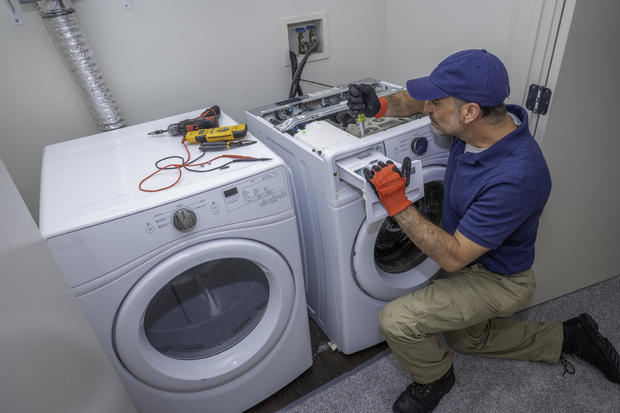Home warranty pros and cons: What to know
When it comes to protecting your house or rental, you have multiple options - from home insurance to security alarm systems to home warranties.
While home insurance is usually required by the mortgage lender and security systems can be pricey and burdensome to install, home warranties are simple, reliable and relatively inexpensive. A home warranty can cover the repair costs of common household items and appliances. If applicable, it could also fully replace the item in question.
If you already don't have one, it's something every homeowner or renter should contemplate getting. Not sure about pricing or if you're in the market for a home warranty? Find out today with a few quick and easy steps.
Like any home expense, there are pros and cons to this unique form of protection. Here are a few to be aware of.
Pros of home warranties
- Price: For a monthly cost averaging between $25 to $100, you can ensure protection and maintenance for appliances you have covered in your deal. Granted, you may not use the service every week or even every month but the cost of the charge is minimal compared to what could be hundreds or thousands of dollars in repairs and replacements down the road.
- Expert service: With this option, you won't have to scramble to find a repair person when something breaks and needs to be fixed or replaced. Home warranty providers have extensive lists of service providers in your area that can arrive quickly.
- Security and peace of mind: There's no price tag to put on comfort. By knowing you have protection - and professional help when needed - you can put appliance repair and maintenance out of mind. With a home warranty, you make this someone else's issue to deal with so you can focus on more important things.
It's probably worth keeping your peace of mind (and your bank account) intact by securing a home warranty now. You can easily put one in place today.
Cons of home warranties
- Limitations: The warranty covers only what's in the agreement with the provider and nothing else. Exclusions specified in the deal are the responsibility of the homeowner. While this may not be a true disadvantage, it can quickly become costly when considering the additional costs for items not covered by the provider.
- Exclusions apply: Home warranties don't provide blanket coverage. Specifically, items or appliances that were already broken or initially installed improperly won't qualify. Similarly, home warranties won't necessarily cover structural, plumbing and electrical adjustments needed to install new items. Make sure you check your contract carefully to see what's covered.
- Less input: Home warranty providers service your appliances on their schedule with their repair providers. While this may seem obvious, if you're someone who prefers to be involved in all stages of the repair process, then a home warranty may not be for you.
This is not an exhaustive list. There are other pros and cons to home warranties that may be specific to your home, rental, appliances and individual preferences. First, determine the coverage you need. Then think about the additional coverage you may benefit from. Finally, reach out to find out how to put a warranty in place.
Still not sure if you would benefit from a home warranty? Speak to a provider to determine what's best for you and your home.




